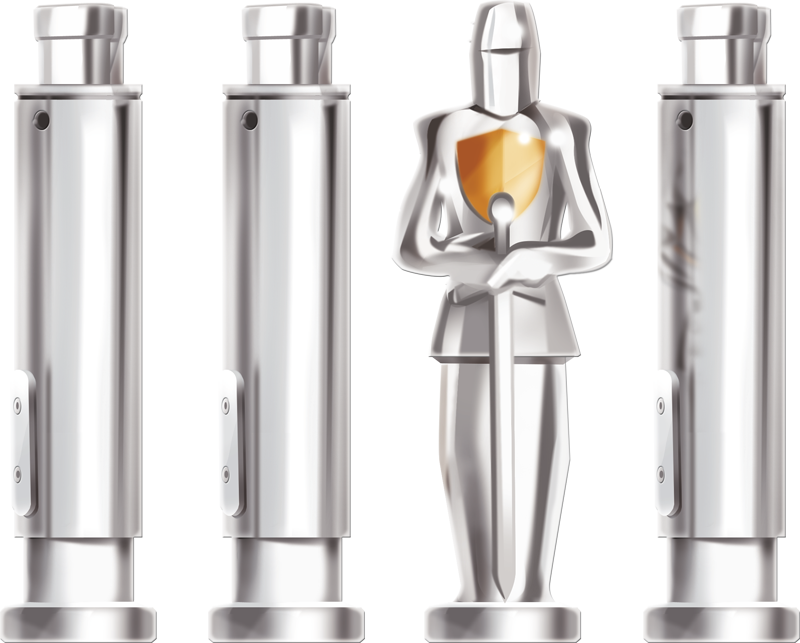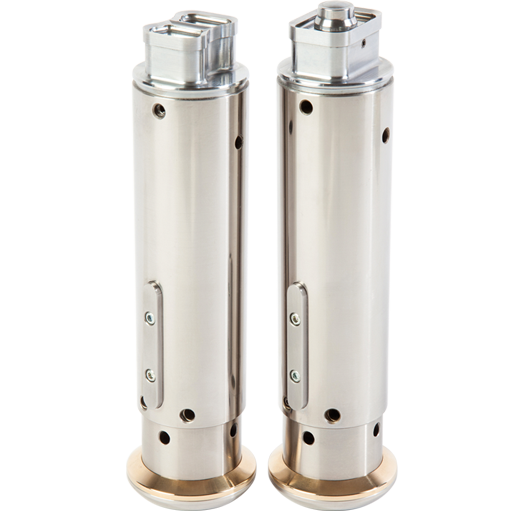Tableting tools, when
highly accurate, tough, robust
and inexpensive
it can only be one of ritter.
Ritter Pharma-Technik GmbH manufactures tableting tools on market leader level for pharmacy and industry.
Decades of experience and industry knowledge goes hand in hand with the endeavor to find the best possible
solution for a long-term and cooperative collaboration with our customers.

Be successful in the art of tableting!
This is possible by having a succinct tablet surface and repeatable tabletting results according to the Pharmacopoeia requirement.
Our profession is the production of tableting tools of the heighest conceivable quality. We make no distinction between premium -and standard-production:
A ritter tool is always premium!
What is the basis for making a first –class quality?
- Due to sophisticated manufacturing processes we achieve a minimization of the tolerances; in tableting tool set we minimize the function-length tolerance to less than 1/100mm, with the result that the tablet press running is smoothly, wear is reduced even when increasing the tablet-press rotation speed. Tablet-weights and tablet-hardness are uniform.
- Radii and engravings are executed precisely according to customer specifications. Only if you want suggestions for improvement we would make a deviation from the original specifications.
- The steel selection is strictly based on the specific requirements. We will not sell materials, we just stock, but we choose the material after consultation with our customers.
- ritter sells tools on leader level – but the price is 20-30% lower than the price of adequate market companions. Note: (An „adequate market companion“ is a company of mainly German origin that manufactures tools of consistent quality).
STEEL GRADES
quality – matched to product and operating conditions – professional heat treatment
Steels which are suitable for tabletting tools should be of high quality. Alloying elements should be at least 5%. Alloying elements are especially chromium, molybdenum, vanadium, manganese or nickel (Note: nickel-containing steels, we use only if specific customer specification as nickel-allergic people could get skin irritation in contact with nickel-containing tools)
ritter used exclusively high quality steels with 5% alloying elements at least.
A steel with alloying elements less than 5% can not be hardened to the required wear resistance or tends to corrode or to punch fracture. Manufacturers often offer stamp coatings that would not have been necessary if a high quality and matching steel would have been elected.
ritter tools are hardened by a specialist in heat treatment
We have chosen an excellent service for the heat treatment. The heat treatment has limitations which are due to the physical properties of the steels. The daily business of this service is to test these limits. Together with our service provider for the heat treatment we are able to utilize the specific virtues of certain steel grades
Without a professional heat treatment there is no reproducibility in the manufacturing process. Consequently, it is the prerequisite for the production of high-quality tools with dimensional accuracy, high wear resistance and fracture stability.
Only after intensive consultation and exchange of informations, we choose the material.
Various bulk goods have specific and various properties. The production conditions are unique. Depending on the conditions we provide highly corrosion resistant tools or tools with extreme wear resistance or tools with highest fracture stability despite sensitive contour. Often occur several problems at the same time. In such a case we can offer the manufacture of experimental tools until a sufficient solution is found.

EU-28-441, 4-tip tooling,
with pin fixation,
Oval tablets
Specific structural design combined with high-precision production lead to a high-quality tool of a special kind with reproducible compressing results in mass production.
EURO-D 441, Fette Oblong,
21 x 10 with breakline.
Tough and robust
are the primary features of a high quality tableting tool of ritter.
Special steels allow increase of the compressing force without tool breakage occurs.

For the production of mass you need a tooling of top class …
Increasing efficiency and competitiveness with multiple tools of ritter.
The narrowing of the tolerance range to less than 1/100 mm within the entire tool set is also achieved for multiple tools. So a linear increase in output is possible, means to increase the output to x factor with an x-fold tooling, in replacement of the Monoblock tooling by x-fold.
Circa since year 2008, one-piece multiple tools are offered on the market.
For these products instructions should be given regarding load capacity and terms of use.
One-piece multi-tools have two advantages compared to multipart multiple tools,
- GMP compliant cleaning is facilitated
- the stamp number may be slightly higher
However, there are also significant disadvantages,
1. Tolerances must be widened, because the one-piece multi-tool is structurally rigid. The machine running is impaired and product loss increases
2. one often hears from the assumption that a one-piece multi tool would have a longer useful life, with justification tool breakage occured less frequently. But that is definitly a fallacy! Integral multiple toolings suffer on fracture exactly at that spot where multi-piece cap attached tools are already divided. A one-piece multi-tool, as already mentioned, is a rigid body. Therefore the tool is produced with a lowered hardness, less than is usual for tableting tools. Result of reduced hardness could be: plastic deformation and /or impaired maschine running
3. a serious disadvantage of the one-piece multi-tools is that a combination of different steel grades is not possible! So you can not choose the most suitable steel for punch-head, punch-holder or inserts. Ideally, one chooses for head and holder a very wear-resistant steel which permanently withstand the load below the pressure roller and for the tip section, a tough steel, which has fracture stability
4. the manufacturing is similar to a corrosion process; the surfaces are rough. Rough surfaces tend to adhere tableting mass, which could lead to impaired machine running
5. the scraping edge is formed weaker, which is due to the details of manufacturing. The weaker scraping edge coupled with a stronger material adhesion in the dies and impaired machine running
You can get one-piece multiple tools at ritter, but we advise the purchase of multi-part multiple tools due to the various disadvantages of the integral multiple toolings.
EURO-B 7-tip tooling, D=5mm with
cap-fixation,
solid construction with optimized arrangement of the punch inserts,
a powerful tool that provides major economic benefits


EURO-D-441, 2-tip tooling with three breaklines, with pin-fixation
Tool with high dimensional accuracy and precision; the available space is optimally utilized.
Advantageously, the interchangeability of the inserts; Inserts and holders can be made of different materials.
An excellent adaptation to specific needs is given. The safe working processes prevent tool breakage even with multiple tools with pin-fixation
ritter – pioneer of mini tableting technology
ritter developed by 1987-1988 a process for the production of mini tabletting tools, which since that time – until today – is the industry leader. The safe manufacturing process applies to all conceivable variants regardless of the tablet-press or tool type.
Minitableting tooling of ritter precise and stable as a monoblock tooling
Mini tablets are flat or curved tablets with a 1.0-3.0 mm diameter which, for pharmaceutical use, are normally filled in hard gelatine capsules Mini tablets can be an alternative to normally sized tablets, if there are specific preparation requirements as regards the following aspects.
More information can be found under: Minitableting in pharmacy
Minitableting tooling are made with the highest precision. Mounted the toolings are in the tolerance range of 0 to 0.02 mm
the matching accuracy exists between punchholder and tip and it also exists for the function-length of each individual tip and as the precondition for the constancy of the tablet weights.
Exquisite, wear-resistant material for inserts, holders and heads gives you the greatest possible service life.
valuable materials store highest lifetime Minitableting tooling we offer in the range of D = 1,2-3,0mm,
As 19 – 37 tip tooling, manufactured by ritter standard methode reliably for 30 years

EURO-D-441, Fette 37-tip tooling with tablet-diameter= 2,25 mm
The die we offer mainly of tungsten-carbide for the case of strongest wear Cap-fixation, with highest dimensional accuracy and precision, space is optimally utilized, nevertheless, there is interchangeability of tips.
We offer our customers additional training, also at your site.
Your employees will learn the most important facts in connection with installation, assembly and maintenance. We provide free 2-3 stations minitableting tooling to testing purposes.
Release profile/drug absorption
- thanks to the increased surface in relation to volume, the drug can be released more efficiently
- a controlled release process, as in depot/delayed drug formulations or in formulations which consist of initial and maintenance doses are usually based on release through a retarding film coating. If this film is not completely intact, drug release is no longer controlled. Simultaneous perforation of the film in a large number of mini tablets is unlikely. Thus, the release process can be controlled with greater certainty.
- by combining differently dosed mini tablets, it is possible to achieve several different releases with one formulation.
- due to the significantly smaller dimensions of the mini tablets in comparison to a normally sized tablet, the mini tablets pass through the stomach at a more even rate. As a result, the absorption, and therefore also the concentration of the drug in the blood can be more easily reproduced than in the case of a normally sized tablet
A comparison of pellets/ mini tablets
Pellets are small “beads” of medium to high uniformity, with particle sizes comparable to those of mini tablets. Pellets are produced via either disk or fluid bed granulation, or alternatively via extrusion and subsequent spheronization. In contrast to this technically demanding process, mini tablets are not infrequently manufactured via direct tabletting.
The advantage here is also that, contrary to conventional pelleting processes, it is not necessary to add water or aqueous solutions, and therefore problems with stability can be avoided.
Thanks to their smooth surface, low degree of porosity and high mechanical strength, the mini tablets are easier to give a film coating than pellets, which have an uneven surface and are very porous. The mini tablet coats are smoother, which means that the conditions for reproducible drug release are more favourable.
Development of new applications
Pharmaceutical preparations with minitablets are very succesful for 30 years in the field of pancreatic enzyme substitution.
For 10 years Mini tablets are the focus of development in pharmaceutical preparations aimed at the specific requirements of child-friendly drug delivery. For this patient group in particular the possibility of administering precisely proportioned minute dosages may be highly beneficial.
In the context of studying and describing the properties of mini tablets we would like to refer to two of theses (2012) written at the University of Düsseldorf under the supervision of Prof. Breitkreuz.
Orodispersible mini tablets, development and characterization of a novel solid dosage form for pediatric patients of Dr. Ines Wening (today Dr. Ines Stoltenberg).
Child-friendly preparation, with low-dose Enalapril-maleate of Dr. Martin Hermes.

Dishwasher and waschtab tools.
Tools for specific technical applications
Tab-Toolings are often exposed to extreme loads, pull down forces and press forces. For this reason we choose materials with highest wear resistance for punch-heads and punch-holders; but the punch-tips must be especially tough to resist plastic deformations and deformation fracture.

KILIAN 50/ 54
Rectangle, with product specific punch-tip, shape waisted with breakline or shape with power ball-insert
EVOLUTION TO THE STATE OF ART
Modularly designed tool to use the maximum benefit period of the individual components. The specific manufacured design of the punch tips prevents product adhesion and in consequence increased ejection forces. The punch inserts are preferably made of a very tough steel; This steel resists both corrosion and high compression forces. The stamp heads are made of wear-resistant material; the service life is also extended with abrasion resistant rings.
The tool dimensions are very uniform, although it is assembled from three different components. The tolerance range is 0,01 – 0,02 mm.